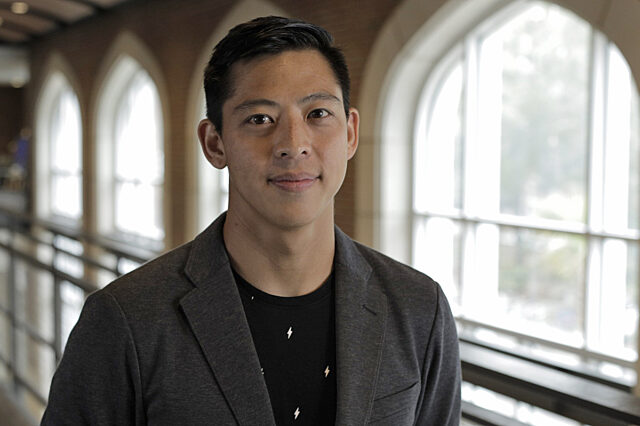UF Health researcher awarded $2.5 million to study cell function in neurodegenerative diseases

In the human nervous system, proteins, RNA and other cellular material need a free-flowing molecular highway. But when a “traffic jam” develops, the consequences are severe: One of several neurodegenerative diseases can arise. A better understanding of how and why those genetic traffic jams occur is an important step toward understanding disease progression.
University of Florida Health genetics researcher Eric Wang, Ph.D., has been awarded a five-year, $2.5 million grant to determine how certain proteins and RNA are chosen for a crucial trip on the intracellular highway. He will also develop mouse models that better mimic how certain neurodegenerative diseases, in particular repeat expansion diseases, present in humans.
Funding for the research comes from the Chan Zuckerberg Initiative Neurodegeneration Challenge Network. CZI is a philanthropy formed by Mark Zuckerberg, founder and CEO of Facebook, and Priscilla Chan, a pediatrician and founder and CEO of The Primary School in East Palo Alto, California.
Evidence suggests that disrupted cellular trafficking underlies disorders such as myotonic dystrophy, Huntington’s disease and amyotrophic lateral sclerosis, often referred to as Lou Gehrig’s disease. Those diseases are caused when three or more letters of the genetic code are repeated too many times.
But Wang said far less is known about how a cell’s transport machinery chooses its genetic cargo. He likens the process to package deliveries: Neurons are relatively large cells, and Wang and his colleagues want to know how the contents of genetic packages are picked and then transported to their destinations. Understanding how that process ultimately goes awry in neurodegenerative diseases will provide important insights for developing future treatments, he said.
“Almost everyone knows someone affected by neurodegeneration. So the opportunity for us to make an impact through basic studies of cell function is highly meaningful and rewarding,” Wang said.
He also plans to take on a problem that has confounded neurodegeneration researchers by developing a better mouse model to study repeat expansion diseases. The issue: While DNA repeat expansions are known to dramatically lengthen over many years in humans, mice live relatively short lives, preventing them from manifesting the full spectrum of disease symptoms experienced by people. Speeding up the repeat expansion process in mice will also allow scientists to better study how changes in intracellular trafficking cause neurodegeneration, Wang said.
He is among 17 early-career scientists and nine collaborative science teams sharing $64.25 million in funding to launch the CZI Neurodegeneration Challenge Network. This new network brings together experimental scientists from diverse research fields — neuroscience, cell biology, biochemistry, immunology and genomics — along with computational biologists and physicians, to understand the underlying causes of neurodegenerative disorders.
“To fill gaps in our understanding of neurodegenerative diseases, we need to support new approaches, explore new ideas, and help experts connect across disciplines,” said Cori Bargmann, CZI head of science. “We're excited to welcome the first group of CZI Neurodegeneration Challenge Network grantees. Together, their work will increase our knowledge of the basic biology of these diseases -- and we need that knowledge to develop better treatments.”
Wang said he is excited at the prospect of building a genetic roadmap for understanding how important cellular trafficking takes place.
“My hope is that this knowledge can help pave the preclinical path to developing therapeutics for a number of neurodegenerative diseases,” he said.
About the researcher: Eric Wang., Ph.D., is an assistant professor in the UF College of Medicine’s department of molecular genetics and microbiology. He is a faculty member of the UF Center for NeuroGenetics, and the UF Myology and Genetics institutes.
About the Chan Zuckerberg Initiative: The Chan Zuckerberg Initiative was launched in December 2015 by Mark Zuckerberg, founder and CEO of Facebook, and Priscilla Chan, a pediatrician and founder and CEO of The Primary School in East Palo Alto, California. The Chan Zuckerberg Initiative is a new kind of philanthropy that seeks to engineer change at scale. By pairing world-class engineering with grant-making, impact investing, policy and advocacy work, the CZI hopes to build a future for everyone. Initial areas of focus include supporting science through basic biomedical research and education through personalized learning. CZI is also exploring ways to address barriers to justice and opportunity — from criminal justice reform, to expanded access, to economic opportunity and affordable housing.
About the author
